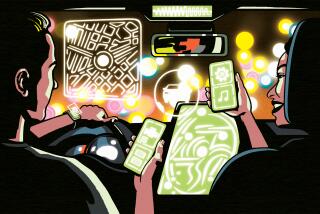Serendipity Lost With Navigation Systems
- Share via
Tooling around in my rental car through some weird and unfamiliar interchanges near San Jose, my co-pilot calls out commands. Get in the right lane. Take the next exit.
The directions come from a little gizmo attached beneath the dashboard. It uses computerized maps and information from orbiting satellites to plot my position and calculate the most efficient route to my destination--and offers directions in an electronic voice so I don’t have to take my eyes off the road.
It’s wonderful and terrible at the same time.
Wonderful because in strange cities, drivers can get where they need to go quickly without a wrong turn. Terrible because in strange cities, drivers can get where they need to go quickly without a wrong turn.
What’s my point?
I’m talking about the loss of serendipity, that discovery of strange and interesting people, places and things completely by accident. Serendipity is what technology fights against. Technology strives for precision and repeatability. Sure, we need a certain measure of predictability in modern life. But we could also stand to lose some.
Nobody really knows how many of these navigation systems are in use today. Navigation Technologies Corp., the company that makes most navigation software, wouldn’t release any numbers. Nor would some of the leading companies that sell and install navigation systems.
One major manufacturer, Magellan Corp., did grudgingly concede that the company has sold “well over” 40,000 navigation systems since 1997 but refused to elaborate. The doodads are a pricey option in some luxury-level automobiles, costing $1,000 to $3,000.
Bottom line: Only a small percentage of the millions of drivers on the road use these systems today. But as the costs come down and the systems become easier to use, they’ll no doubt become standard in most cars.
Right now, it’s still a pain to program the navigation system with start and end points. Manufacturers have developed little tricks to make it easier, with software that tries to guess the name of the street as users pick out letters. But the way to make that process really easy is to develop a system that understands speech, something that’s still a few years away.
Even so, when the cost of these devices drops to less than $400, drivers will no doubt be snapping them up. It means no more worries about getting lost, reduced traffic congestion as the computers quickly find ways around blockages and fewer accidents as drivers no longer try to cut across six lanes of traffic in a last-minute dash to the exit ramp.
All of which is quite cool.
But something will get lost if motorists just blindly follow the instructions issued by a car’s on-board computer. It’s like taking the train to work every day and only seeing the stuff on either side of the tracks.
Driving off onto unknown surface streets is part of what makes driving fun. Spotting an interesting cafe or a landmark widens horizons.
Think about two more common examples: the Internet and television.
The World Wide Web offers untold opportunities to trip upon something new. One minute fish tanks appear on the screen and the next--depending on connection speed-- a page about African health policy.
Yet there’s a distinction between search engines such as Google and directories such as Yahoo. Google provides a hit on every page with keywords. Yahoo lists only those pages that some human being has programmed into it. Using Yahoo might mean missing a lot of citations that are just plain interesting.
And as television systems offer hundreds of channels, there’s no way to scroll through them all to see what’s playing at any given time.
So despite having hundreds of choices, most couch potatoes set up favorite channels, most of which are a subset of the same dozen or so that they usually watch anyway. That means missing stuff on weird channels, such as the foreign language broadcasts, which do, on occasion, open the door to wonderful and compelling art, music and culture from another land.
Of course, it makes sense to use such tools as search engines, favorites and navigation systems to accomplish tasks efficiently. The future will offer more conveniences like these, not fewer--further eroding the ability and the time to do things a little leisurely, to explore and discover.
In short, remember from time to time to turn the navigation system off and let serendipity take the wheel.
*
Dave Wilson is The Times’ personal technology columnist.
More to Read
Inside the business of entertainment
The Wide Shot brings you news, analysis and insights on everything from streaming wars to production — and what it all means for the future.
You may occasionally receive promotional content from the Los Angeles Times.









